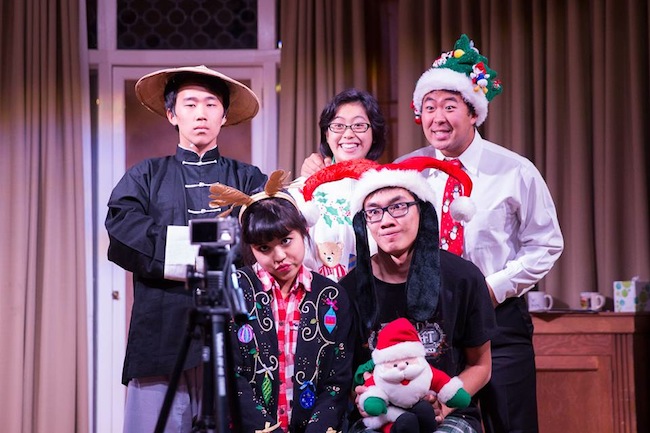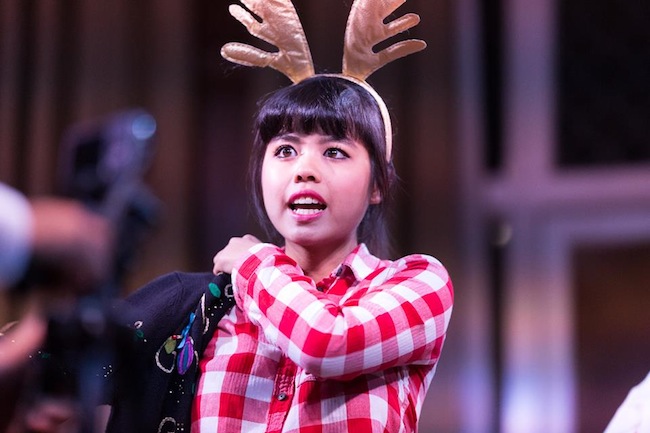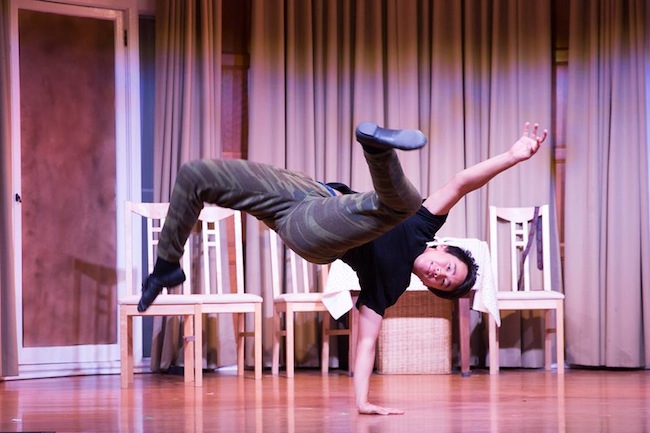
Ching Chong Chinaman opens with the Wong family getting ready to have themselves a “White Christmas.” As they squeeze into a holiday photo, father Ed (played convincingly by Jin Park) reminds his family to open their eyes “nice and wide.” The audience laughs, nervously at first, but then more earnestly, as each character strives comically to overcome the physical manifestations of their race. The camera fires, the flash goes off; the representation has been taken.
But for their eyes and their last name, we would hardly know the Wongs are Asian at all. Made up of third- and fourth- generation immigrants, the family has lost touch with its Chinese heritage. Ed is a golf-loving businessman and wife Grace (Rosemond Ho) languishes in domestic repression. Their children, whitely named Desdemona (Francesca Dawis) and Upton (Matthew Leong), pour their respective time into college applications and World of Warcraft, obsessions often associated with Asian-Americans but notably endemic to Millennials of all ethnicities. Desdemona stresses that she doesn’t have any Asian friends, and no one in the home knows how to use chopsticks… until Upton hires Jinqiang (Adi Chang), an indentured servant from China whose name lends itself to ignorant mispronunciation (see: the show’s title). Jinqiang can use chopsticks, but he can’t stomach the strange take-out dishes which the Wongs call “Chinese food.” He can’t speak any English, and the Wongs don’t speak Chinese.

Ching Chong Chinaman stages the blanching of cultural identity, a phenomenon which today affects families of many backgrounds. The play’s pervasive sense of loss resonated with my experience as a white person. Like the Wongs, my ancestors immigrated far enough back that the specifics of our heritage have been dissolved in the catch-all term “American.” I found myself identifying with Desdemona’s desperate longing for a past. “I need to get it from somewhere,” she laments to her father after he discovers a box of Chinese paraphernalia delivered by InstantHeritage.com. Online genealogy reports and snacks shipped from overseas: these are the ways we try to buy culture for ourselves in this cloying age of late capitalism, a structure bent on eradicating the differences which make us who we are. Once divorced from a sense of heritage, we are all at risk of becoming white - colorless, without form.
Those who feel white rarely want to stay that way. For centuries, European imperialists and their neocolonial heirs have sought to re-paint their lives in vibrant shades pilfered from other cultures; they uphold a tradition of appropriating other traditions. Desperate for flavor, dyed in the wool of upper-middle class privilege, the Wongs are ultimately guilty of the same impulse. They seize on the vague glimmer of a Chinese-Mexican forefather in the family tree and promptly travel to Mexico so Desdemona can have a belated quinceñara. She knows that the struggle associated with her newfound “Latina identity” is sure to give her a boost in the arms race of Princeton admissions. Ed, portrayed as a misogynist patriarch from the start, elicits gasps from the audience as he drops bigoted remarks about Mexicans in between shakes of a maraca and verses of “Feliz Navidad.” We begin to see the Wongs as a family of casual racists. They show little respect for the culture of others, perhaps because they don’t know what it means to have any of their own.

The script’s intentions are blatant: the Wongs are not to be applauded but critiqued. At the same time, they are highly relatable - Desdemona’s narrative in particular strikes a chord with all of us who manically dove through hoops in order to end up at Stanford. At once familiar and horrifying, inducing both chuckles and shock, the family on stage exists as an unflattering mirror, satirically reflecting the effects of cultural drought in the twenty-first century. Their dual alienation, from people of other cultures as well as from their own, typifies life in the modern American suburb. This is an ugly truth, but a truth nonetheless. We squirm when we hear racist humor in the theatre, not because the production is thereby racist, but because it has succeeded in representing the racist order in which we are immersed every day. Extracted from our lives and enacted under stage lights, the banalized norm confronts us in all its hideousness.
I applaud the members of the Asian American Theatre Project for their courage in mounting a show so rife with opportunities for controversy. I believe it is crucial that theatre continues to provoke difficult discussions by dramatizing those aspects of reality which we might prefer not to look at. To criticize a show for putting cultural offenses on the stage would be to mistake the attitudes of characters for those of the actors and producers who work to portray them. There is always some critical distance between a work’s content and its meaning, and this is the gap into which we can pour discourse, interpretation, and critique.
We should be wary of sealing this gap with political correctness and censorship. We should have more plays like Ching Chong Chinaman, plays that wrench the gap open and leave us hanging in between.
Ching Chong Chinaman: 8pm Thursday-Saturday. Roble Theater. Tickets at http://goo.gl/forms/
Photo credit: Frank Chen

Bradley Chin
November 1, 2014 at 8:55 am (3 years ago)Good Job